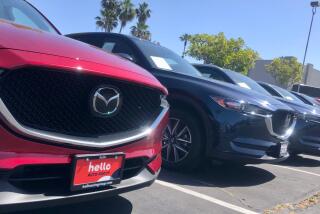Japan Criticized Over Car Pact
- Share via
WASHINGTON — Japan has not lived up to commitments made in a 1995 agreement to open its market to more U.S.-made autos and auto parts, the Clinton administration said Thursday.
Officials urged the Japanese to increase efforts to deregulate the auto-parts market and provide dealership opportunities for cars made in the United States and elsewhere. They did not say what Washington would do should expectations for American sales continue to fall short.
“We are concerned that the progress achieved under the first year of the agreement has not been sustained,” U.S. trade representative Charlene Barshefsky said in a statement released with a six-month review of the U.S.-Japanese auto agreement. “We view the slowdown in new dealership signings and in deregulation of the auto parts replacement market as particularly troubling.”
The report found that sales of cars by General Motors, Ford and Chrysler declined by 20% during the first nine months of this year after increasing by 34% in 1996.
While overall car sales have been sluggish in Japan because of weaknesses in that country’s economy, the administration said the 20% plunge in sales of U.S.-made cars was far greater than the 2% drop in overall car sales.
Neither Japan’s Ministry of International Trade and Industry nor the Japan Automobile Manufacturers Assn. Inc., an industry group, had any immediate comment on the report.
Meanwhile, President Clinton’s national security advisor, Samuel Berger, met Thursday with Japanese Foreign Minister Keizo Obuchi to discuss the financial bailout for South Korea.
Obuchi and Berger reviewed efforts by the International Monetary Fund to stabilize South Korea’s economy with a $57-billion aid package that includes $10 billion from Japan and $5 billion from the United States, White House spokesman Mike McCurry said. Obuchi is scheduled to meet today with Treasury Secretary Robert Rubin.
The auto agreement, reached in 1995 under a United States threat of $6 billion in punitive tariffs on Japanese luxury cars, was aimed at addressing U.S. complaints that Japanese barriers severely limit sales of American cars and parts. Automotive trade accounts for two-thirds of the trade gap between the two countries.
Thursday’s report comes as trade tensions have increased between the two nations because of America’s rising trade deficit, up 19% this year contrasted with a year ago.
Private economists argue most of the widening trade gap can be explained by the weak Japanese economy restraining demand and a stronger dollar in comparison with the Japanese yen. That makes U.S. products more expensive in Japan and Japanese products such as automobiles cheaper in the United States.
The president, meeting with Japanese Prime Minister Ryutaro Hashimoto at an international summit last week, urged the Japanese to do more to stimulate domestic demand, not just to trim the U.S. trade deficit but also to serve as an engine of growth for other troubled Asian economies.
In addition to the big drop in vehicle sales, the administration’s six-month auto review said Japan’s Transportation Ministry has not added new auto parts to a deregulation list that would allow the parts to be installed in independent repair shops rather than dealerships and increase the likelihood that cheaper U.S.-made products would be used.
Even with the lack of deregulation, the report found sales of U.S. auto parts were up 14% in the first half of 1997, with sales of U.S.-made parts to Japanese car companies operating in the United States also showing increases.
The report faulted Japanese efforts to remove obstacles to United States companies’ expanding the number of dealerships handling American cars in Japan. Just 142 dealer outlets have been added since the agreement was signed in 1995, only 28 of which were signed up in the past six months.
Andrew H. Card, president of the American Automobile Manufacturers Assn., said the latest review showed that while the two countries are nearly halfway through the five-year agreement, “Japan is nowhere near the halfway mark in meeting expected market-opening results. . . . Import sales are down, there are far too few dealer outlets, and the Japanese government has been foot-dragging on deregulating the parts sector.”
But William C. Duncan, Washington director of the Japan Automobile Manufacturers Assn., said Japanese consumers want cars designed “to meet their needs and tastes. European makers have done this and are keeping pace with the market. The story is now one of product, not access.”
More to Read
Inside the business of entertainment
The Wide Shot brings you news, analysis and insights on everything from streaming wars to production — and what it all means for the future.
You may occasionally receive promotional content from the Los Angeles Times.










